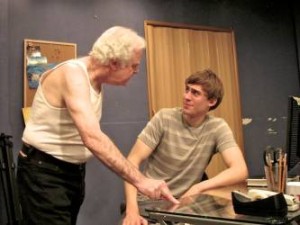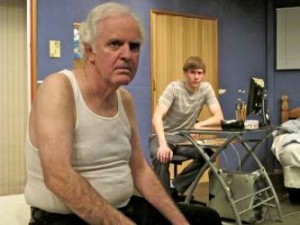
You’d think by now there’d be no need for yet another teenage coming out story, nor would you be likely to expect a playwright to have anything new to offer on the subject.
You’d be wrong.
You’d definitely be mistaken about the first, as the recent spate of gay teen suicides have made abundantly clear. Coming out remains a minefield for teenagers still living at home with conservative (and even liberal) parents and studying in an often hostile school environment doesn’t make their lives any easier. For these reasons alone, coming out stories remain as relevant in 2011 as they were when plays like Beautiful Thing and What’s Wrong With Angry broached the subject in the early ‘90s.
As for any misgivings a theatergoer might have about finding originality in a coming out tale, Paul Elliott’s wonderful Finding The Burnett Heart proves that yes, you can tell an oft-recounted story with freshness and flair.
Impeccably directed by renowned theater-TV-film actor-director Jeffrey Hutchinson and featuring some truly breathtaking work by its cast members, Finding The Burnett Heart is not only one of the most powerful coming out stories ever. It is a play and production that will resonate with anyone who’s ever been confronted with the sin of conditional parental love, is as moving a grandfather-grandson story as you’re likely to have seen, and is frequently hilarious to boot.
Sixteen-year-old Iowan Tyler Burnett (Corey Craig) and Granddad James (James Handy) butt heads from the moment the seventy-eight-year-old retired physician moves into Ty’s bedroom following a fire which has destroyed half his house and made the rest of it inhabitable. Not that intergenerational cohabitation proves any easier than living in a ruined house, not with Ty whining about Granddad’s touching his desk or complaining when James stinks up the bathroom during his grandson’s shower. In fact, it’s only because Ty’s mother Grace (Colleen McGrann) puts her foot down, ordering her father-in-law not to touch anything on Ty’s desk and limiting her son to twenty minutes in the bathroom tops, that the odd-couple roommates don’t attack each other with something stronger than swear words.
Clearly there’d be no peace in the Burnett home without Grace as mediator, and not simply between James and Tyler. The eldest Burnett has no smoother a relationship with grown son Robert (Jeff L. Williams), a furniture salesman whose entire life has been a disappointment to the old man. If Robert is more tolerant of Ty than even Grace would like him to be, it’s only because his own father was a brutal, unforgiving taskmaster who did nothing to hide his preference for other son Jimmy—dead of a heart attack a few years back at the age of forty-two. (Apparently the “fucking Burnett heart” isn’t all that durable a ticker.)
As Granddad and grandson’s shared occupancy of Tyler’s room continues over the course of several weeks, relations between them hardly improve. James boasts of never having given his son Robert the chance to cry, which Ty finds a “crappy way to live if you ask me.” A brief détente does occur when the subject of James’ beloved late wife Dottie comes up, since both teenager and septuagenarian can agree on their love for her, but soon enough James is on Ty’s case again for “bragging on” himself and impatient with the teenager for speeding through a how-to explanation of Internet surfing. (“God damn it, how you expect me to remember all that.”)
The shit really hits the fan, however, when the subject of Tyler’s late Uncle Jimmy and his partner Brian comes up. To James, his divorced son’s roommate had been his business partner, end of conversation. Ty, on the other hand, figured things out when he was just seven or eight and loved gay/dyslexic Uncle Jimmy and Uncle Brian equally, and when Granddad asserts that any gay gene “didn’t come from my side of the family,” Ty lets him have it. If there’s both a gay gene and a dyslexic gene in the Burnett blood, then at least in Ty’s case “praise Jesus, they both didn’t come through.” And just in case Granddad might have gotten it backwards, Ty makes things perfectly clear: “I’m saying, goddamnit, that I’m not dyslexic!”
As to what happens once James has blabbed to son and daughter-in-law (as the S.O.B. soon does), suffice it to say Tyler’s parents’ reaction to their son’s sexual orientation may surprise you, as may James’s response to it, and Ty’s as well. Had Finding The Burnett Heart been written thirty, twenty, even ten years ago, it would likely have been a very different play, and precisely the kind of drama to prompt a “been there, seen that” reaction from a contemporary audience. A 2011 look at coming out in Middle America, on the other hand, is entirely relevant to our time, and a tale well worth telling.
Playwright Elliott earns points for demonstrating how well-meaning people of faith can demonize and condemn when they ought to be promoting understanding and acceptance. He gets kudos for creating a teenaged character with all the doubts and insecurities of adolescence but with a sense of self and self-worth made stronger in this Internet age of gay visibility. He deserves snaps for creating a senior citizen and a teenager who defy stereotypes, and whose relationship is one rarely shown on stage or screen. He merits applause for writing a story so unpredictable that a major plot twist had this reviewer gasping. Finally, he scores an A+ for managing to do all this with considerable humor, prompting this reviewer to place Finding The Burnett Heart in the comedy-drama category despite its having some of the most gut-wrenchingly written and performed scenes you’re likely to see all year.
Los Angeles County High School For The Arts grad Craig is a real find, a charismatic delight from start to finish as Ty, giving us all the doubts and bravado and tenderness and anger and angst of a horny, ornery teen. Williams excels too as a father whose rebellion against his own dad has contributed to his success at raising Ty, but may also have kept him from a more fulfilling career, having chosen his path in life as much out of spite as anything else. That the two actors could easily pass for father and son is an added plus, as is the palpable warmth in their scenes together.
As for Granddad and Mom, Elliott has given them Finding The Burnett Heart’s richest parts to play, a pair of roles which Handy and McGrann knock out of the ballpark. Handy’s (and Elliott’s) James is such an honest depiction of a septuagenarian that it puts the usual Hollywood stereotypes to shame. Feisty and fuming yet still fierce and vital, Handy gives an incisive, richly-layered performance with a precision actors one quarter his age might struggle to achieve. (We’re talking loads of lines to learn and loads of cues to pick up on, both of which Handy does—forgive the pun—quite handily.) McGrann’s Grace starts out so much the frustrated yet Nobel prize-worthy peacemaker of the Burnett home that later scenes, which ask the actress to dig deep and exhibit a mix of fire, ice, and ache, reveal work that is simply dazzling.
Tyler’s bedroom set looks so much like a real teenager’s room that it’s a shame no one is given credit for it in the program. Carey Dunn’s lighting is simple (as befits the piece) but effective, as is the (again uncredited) sound design. Megg Sicotte-Kelly’s costumes are just what these characters would wear. McGrann is producer, Craig co-producer. Jennifer Palumbo is stage manager, Crystal Lujan casting director, and Johny Resendiz board operator. Tyler’s art work is by Claudette Dunn., Brian Wangenheim, and Nick the Ring.
Finding The Burnett Heart is the kind of production that can easily find itself ignored in L.A.’s overly crowded theater scene. It is not part of a company season, is playing at a theater most theatergoers are probably not familiar with, and has no major L.A. “names” attached to it. For these reasons alone, it’s the kind of production this reviewer usually ends up having to pass on (given that I can only review one out of every three shows I am invited to see), and even now, more than midway through its run, this review is I believe the production’s first. And how unfortunate this is. Finding The Burnett Heart is well worth seeing, and the charming (and free parking-abundant) Missing Piece Theatre is well worth discovering.
Though there are a number of equally fine, equally entertaining, equally moving depictions of family dysfunction now playing in L.A.-area intimate theaters, I urge you to take a chance on this dark horse, particularly since its run is a short one. If you’re anything like this reviewer and his equally ecstatic guest, you’ll be telling everyone you know not to miss Finding The Burnett Heart.
The Missing Piece Theatre, 2811 West Magnolia Blvd., Burbank.
http://www.brownpapertickets.com/event/173963
–Steven Stanley
May 29, 2011




 Since 2007, Steven Stanley's StageSceneLA.com has spotlighted the best in Southern California theater via reviews, interviews, and its annual StageSceneLA Scenies.
Since 2007, Steven Stanley's StageSceneLA.com has spotlighted the best in Southern California theater via reviews, interviews, and its annual StageSceneLA Scenies.







 COPYRIGHT 2024 STEVEN STANLEY :: DESIGN BY
COPYRIGHT 2024 STEVEN STANLEY :: DESIGN BY